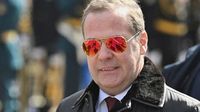In a sharp escalation of rhetoric, Dmitri Medvedev, the deputy chairman of Russia's Security Council, dismissed Ukrainian calls for a ceasefire, suggesting that Western leaders could "shove their peace plans up their asses." This statement, made on the social media platform X, came in response to a meeting in Kyiv involving key European leaders, including German Chancellor Friedrich Merz, French President Emmanuel Macron, British Prime Minister Keir Starmer, and Polish Prime Minister Donald Tusk.
The Ukrainian President, Volodymyr Zelensky, announced during these discussions that sanctions would be imposed on Russia should it fail to agree to a ceasefire starting on Monday, May 12, 2025. Zelensky emphasized that if Russia refused a complete and unconditional ceasefire, it would face intensified sanctions, particularly targeting the energy and banking sectors.
Medvedev's remarks reflect a broader rejection of the ceasefire proposal, which was presented as a demand from Ukraine and its European allies for a 30-day truce. He questioned the wisdom of presenting Russia with an ultimatum that pits a ceasefire against new sanctions, sarcastically asking if it was smart to force Russia into such a position.
In his tweet, Medvedev expressed disdain for the leaders' threats, stating, "Macron, Merz, Starmer, and Tusk should be discussing peace in Kyiv. Instead, they are issuing threats against Russia." This vulgarity is not new for Medvedev, who has frequently used provocative language to criticize Western policies.
Kremlin spokesman Dmitry Peskov added to the tension by stating that Russia is not deterred by sanctions and that a ceasefire must not allow Ukraine to rearm itself. He outlined a concrete condition for any ceasefire: the cessation of Western arms deliveries to Ukraine. Peskov's comments suggest that Russia is keeping its options open in light of the demands from European states and the United States.
As global tensions rise, the diplomatic landscape remains fraught. The meeting in Kyiv aimed to pressure Russia into compliance, but the Kremlin's response indicates a hardening of its stance. Peskov criticized the contradictory statements emanating from Europe, characterizing them as confrontational rather than constructive.
Medvedev's use of vulgar language and his position as a prominent Russian official underscore the deepening divide between Russia and the West. His comments, particularly the phrase "shove these peace plans up your pangender arses," reflect a provocative approach that seeks to undermine the legitimacy of Western diplomatic efforts.
Zelensky's insistence on sanctions as a tool of pressure highlights the ongoing struggle for Ukraine to secure international support against Russian aggression. The Ukrainian leader's remarks were made in the context of a broader strategy to rally European allies around a unified response to Russia's military actions.
Moreover, the potential sanctions discussed by Zelensky and his allies are expected to target critical sectors of the Russian economy, aiming to weaken its capacity to sustain military operations. Zelensky stated, "We know that the United States supports us," reinforcing the notion that Ukraine's strategy is heavily reliant on Western backing.
As the deadline for the proposed ceasefire approaches, the situation remains precarious. The Kremlin's refusal to accept the terms laid out by Ukraine and its allies suggests that further escalation is likely. The international community watches closely as both sides prepare for potential outcomes that could reshape the conflict.
In summary, the exchange between Ukrainian leaders and Russian officials highlights the ongoing tensions and the challenges of achieving a peaceful resolution. With both sides entrenched in their positions, the prospect of a ceasefire appears dim, and the looming threat of sanctions adds another layer of complexity to the situation.


